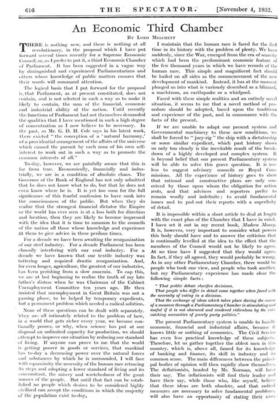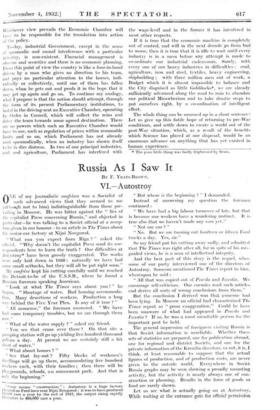An Economic Third Chamber
BY LORD MELCHETT
THERE is nothing new, and there is nothing at all revolutionary, in the proposal which I have put forward several times recently for a Supreme Economic Council, or, as I prefer to put it, a third Economic Chamber of Parliament. It has been suggested in a vague way by distinguished and experienced Parliamentarians and others whose knowledge of public matters ensures that their words will command attention.
. The logical basis that I put forward for the proposal is that Parliament, as at present constituted, does not contain, and is not selected in such a way as to make it likely to contain, the sum of the financial, economic and industrial ability of the nation. Until recently the functions of Parliament had not themselves demanded the qualities that I have mentioned in such a high degree of concentration as I now believe to be necessary. In the past, as Mr. G. D. H. Cole says in his latest work, there existed "the conception of a 'natural harmony,' of a providential arrangement of the affairs of the universe which caused the pursuit by each man of his own self- interest to work out in such a way as to promote the common interests of all."
To-day, however, we are painfully aware that this is far from true. Economically, financially and indus- trially, we are in a condition of absolute chaos. The Governor of the Bank of England has not only admitted that he does not know what to do, but that he does not even know where he is. It is yet too soon for the full significance of this fearful confession to have sunk into the consciousness of the public. But when they do realize that the strongest financial dictator the Empire or the world has ever seen is at a loss both for direction and location, then they are likely to become impressed with the idea that it is time to summon to the councils of the nation all those whose knowledge and experience lit them to give advice in these perilous times.
For a decade we have been awaiting the reorganization of our steel industry. For a decade Parliament has been clumsily interfering with our coal industry. For a decade we have known that our textile industry was tottering and required drastic reorganization. And, for even longer, agriculture, the greatest of our industries, has been perishing from a slow anaemia. To cap this, we arc at last beginning to realize the truth of my late father's dictum when he was Chairman of the Cabinet Unemployment Committee ten years ago. He then insisted that unemployment in Great Britain was not a passing phase, to be helped by temporary expedients, but a permanent problem which needed a radical solution.
None of these questions can be dealt with separately. They arc all intimately related to the problem of how, in a world that gets richer every year, we become con- tinually poorer, or why, when science has put at our disposal an unlimited capacity for production, we should attempt to improve our situation by reducing our standard of living. If anyone can prove to me that the world is getting poorer in goods or services, that mankind has to-day a decreasing power over the natural forces and substances by which he is surrounded, I will face with equanimity the necessity of the human race retracing its steps and adopting a lower standard of living and its concomitant, the misery and wretchedness of the great masses of the people. But until that fact can be estab- lished no people which desires to be considered highly civilized can accept the conditions in which the majority of the population exist to-day, I maintain that the human race is faced for the first time in its history with the problem of plenty. We have suddenly, since the War, emerged from the era of scarcity which had been the predominant economic feature of the few thousand years in which we have records of the human race. This simple and magnificent fact should be hailed on all sides as the commencement of the new development of mankind.. Instead,* it has at the moment plunged us into what is variously described as a blizzard, a maelstrom, an earthquake or a whirlpool.
Faced with these simple realities and an entirely novel situation, it seems to me that a novel. method of pro- cedure should be adopted, based upon the traditions and experience of the past, and in consonance_ with the facts of the present.
If we are unable to adapt our present system and Governmental machinery to these new conditions, we shall be forced to " jury-rig " the ship with a dictatorship or some similar expedient, which past history shows us only. too clearly is the inevitable result of the break- down of a highly developed and complex system. It is beyond belief that our present Parliamentary system will be able to solve this grave question. It is use- less to suggest advisory councils or Royal Com- missions. All the experience of history goes . to show that rational and constructive plans are only con- ceived by those upon whom the obligation for action rests, and that advisers and reporters. prefer to remain woolly and indefinite ; to avoid fundamental issues and to pad out their reports with a superfluity of detail.
It is impossible within a short article to deal at length with the exact plan of the Chamber that I have in mind. I have set it out in my recent book, Modern Money. It is, however, very important to consider what powers this body should have and to answer the criticism that is continually levelled at the idea to the effect that the members of the Council would not be likely to agree. At no time have I suggested that they would agree. In fact, if they all agreed, they would probably be wrong. As in any other Parliamentary Chamber, there would be people who took one view, and people who took another, but my Parliamentary experience has made clear the following simple facts :
"That public debate clarifies decisions.
That people who differ in detail come together when faced with the necessity of voting in a division.
That the exchange of ideas which takes place during the course of a measure through a Parliamentary Chamber is stimulating and useful if it is not obscured and rendered ridiculous by the vole- catching necessities of purely party politics."
The present Parliamentary system is unable to handle economic, financial and industrial affairs, because it knows little or nothing of economics. The Civil Service has even less practical knowledge of these subjects. Therefore, let us gather together the ablest men in this country, which is, above all, famed for its knowledge of banking and finance, its skill in industry and its common sense. The main differences between the princi- pal bodies of opinion will then rapidly show themselves. The deflationists, headed by Mr. Norman, will have their say. The inflationists will find their leader and have their say, while those who, like myself, believe that these ideas are both obsolete, and that radical measures are necessary to solve fundamental problems, will also have an opportunity of stating their. case. Viiichever view prevails the Economic -Chamber will have to be responsible for the translation into action of the policy.
To-day, industrial Government, except in the sense of pasmodic and casual interference with a particular industry, is non-existent. Financial management is obscure and secretive and there is no economic planning. From this point of view the country is like a four-in-hand driven by a man who gives no direction to his team, and pays no particular attention to the horses, indi- vidually or collectively, until one of them has fallen down, when he gets out and prods it in the hope that it may get up again and go on. To continue my analogy, what I propose is that the nation should attempt, through the form of its present Parliamentary institutions, to instal in the driving-seat an Executive Chamber, operating by Order in Council, which will collect the reins and drive the team towards some agreed destination. There are no powers which such an Executive Chamber would have to use, such as regulation of prices within reasonable limits and So on, which Parliament has not already used spasmodically, when an industry has shown itself to be in dire distress. In two of.our principal industries, coal and agriculture, Parliament has interfered with the wage-level and in the former it has interfered in most other respects.
• If it is true that the economic machine is completely out of control, and will in the next decade go from bad to worse, then it is true that it is idle to wait until every industry is in a mess before any attempt is made to co-ordinate our industrial endeavours. Surely, with every one of our heavy industries in difficulties : coal, agriculture, iron and steel, textiles, heavy engineering, shipbuilding ; with three million men out of work, a Budget which it is almost impossible to balance and the City disguised as little Goldilocks*, we arc already sufficiently advanced along the road to ruin to abandon our political Micawberism and to take drastic steps to put ourselves right, by a co-ordination of intelligent effort.
The whole thing can be summed up in a short sentence: Let us give up this futile hope of returning to pre-War conditions, and settle down to create a world out of the post-War situation, which, as a result of the benefits which Science has placed at our disposal, would be an enormous advance on anything that has yet existed in human experience.
* The poor little thing was badly frightened by bears.











































 Previous page
Previous page